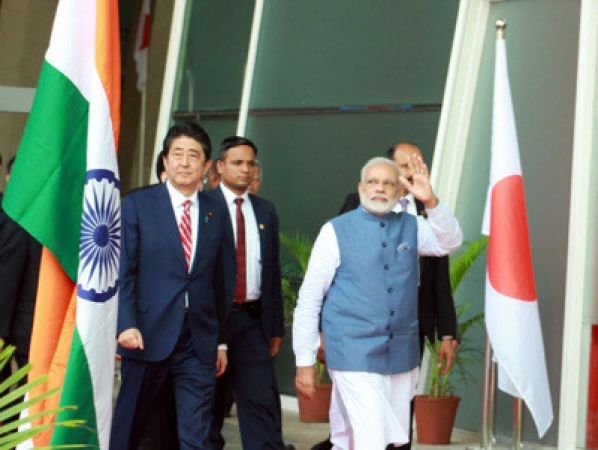
AHMEDABAD: The inventive declaration of India's first bullet train project on Thursday signaled the fast-tracking of India-Japan binds as PM Narendra Modi and PM Shinzo Abe, looked to intentionally line up India's 'Act East' policy with Japan's "free and open Indo-Pacific" inventiveness and approach for an Asia-Africa "growth corridor".
Abe's suggestive reference to how integration of Japan's 'Ja' and India's 'I' will result in 'JaI' at the launch of the bullet train project messenger the warmth in ties. While the Japanese PM said he would do all he could for India, Modi act in response by saying Japan was a true friend which provided loans at almost no interest. "The difference a half percent can make in interest rates is evident, mainly to people in Ahmedabad. Here is a true friend who says 'Pay back the loan over 50 years'," said Modi and make an impression for Abe's commitment to Strengthen “Make in India”.
Modi's fourth yearly summit with Abe saw a strong commitment to ensuring unrestricted commerce and trade from beginning to end the India-Pacific region with the union of India's interests with Japan's Free and Open Indo-Pacific strategy offering an alternative vision to China's OBOR (One Belt, One Road). India and Japan signed 15 agreements after the talks, one of which was to create an Act East Forum.
The forum will aspire at pleasing to the eye connectivity and promoting developmental projects in India's northeast in a "well-organized and efficient manner". With bearing in mind OBOR as an instrument to further China's geopolitical objectives, the two PMs delivered a clear message to Beijing as they called on India and Japan to play a central role in safeguarding a rule-based order in the India-Pacific through maritime security cooperation, more defense exchanges and by improving connectivity.
In spite of the focus on strengthening defense cooperation, the two countries couldn't finalize an agreement for purchase of US 2i surveillance aircraft by India from Japan. Foreign secretary S Jaishankar said negotiations were still on. Also, India and Japan have strong-willed to drop a specific mention of South China Sea from the joint statement despite reaffirming their commitment to freedom of navigation and over flight in the India-Pacific. Jaishankar said the principle was being acknowledged in the reference to India-Pacific rather than "specific geographies". This is important as India and China weeks ago productively sat on the Doklam stand-off.
PM Modi: Bullet train is an innovative national aviation policy for Indian Railway
Paris to host 2024 Olympic while Los Angeles awarded 2028
Aly Goni is welcomed by Karan Patel with a heartfelt message
Jaishankar said the joint statement dealt with a full set of subjects in the Indo-Pacific and under that all "sub-sets" were sheltered. On the other hand, the fact is that both 2016 and 2015 Modi-Abe joint statements had a specific reference to South China Sea while underlining the implication of freedom for navigation.